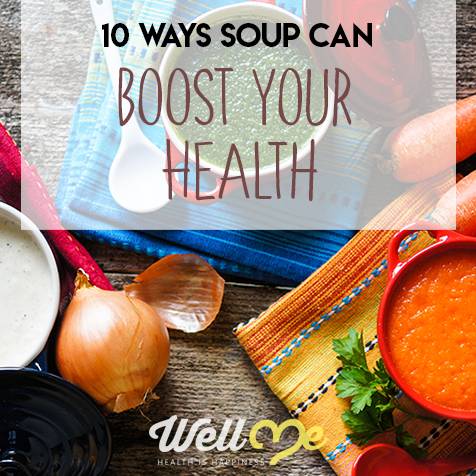Unless you’ve been living under a rock, you’re probably familiar with the juicing craze – the craze that sent thousands (maybe millions) of people rushing out to buy multi-hundred-dollar appliances that did nothing but extract liquid. Next came the smoothie fad – the craze that had everyone burning out their blenders trying to liquify ingredients into an unappetizing green mess.
If you’re tired of diet trends that don’t do much besides empty out your bank account, we have good news! The latest health trend is one you might already be following without even knowing it. It doesn’t involve any expensive equipment and it’s easy to implement into your current diet and lifestyle.
What is it? Soup! If you want to learn why soup should be your next health craze, keep reading. In this article we’ll explore the health benefits of soup and give you some helpful tips for making delicious and nutritious homemade soups.
The Top 10 Health Benefits of Soup
While a steaming bowl of clam chowder loaded up with soda crackers and extra cheese might not be the definition of “healthy,” a wholesome soup made with lean meats, vegetables, and beans or whole grains can be a very healthy meal indeed. But what exactly are the health benefits associated with this kind of soup? Keep reading to find out!
It Can Increase Your Intake of Healthy Nutrients
As you can imagine, the health benefits of soup are closely linked to the ingredients used – the healthier the ingredients, the healthier the soup.
A soup made with nutrient-rich ingredients has the power to significantly boost your daily intake of healthy nutrients. This is particularly true when you use soup to replace another unhealthy meal like a cheeseburger or a steak fried in butter.
A healthy diet is all about balance and variation – the more healthy foods you include in your diet, the more diverse and balanced your diet will be. Eating more soup can help you achieve that goal!
It Can Help You Lose Weight
Though it is certainly possible for a soup to be full of calories and fat, soups that feature lean proteins and healthy vegetables can support you in your weight loss goals. By replacing a high-calorie meal with a nutrient-rich soup, you can cut your daily calorie intake without feeling deprived. In addition to helping you lose weight, adding more healthy soup to your diet can help you maintain a healthy bodyweight.
If you want to maximize the weight loss benefit of eating soup, make sure you are loading up your soup with veggies and whole grains – these ingredients can help you feel fuller longer, helping you to avoid snacking and cutting your total daily calorie intake. A study conducted at Penn State University revealed that participants who ate chicken and rice soup instead of a casserole made with similar ingredients reported feeling equally satisfied, despite consuming fewer calories[1].
It Can Lower Your Blood Pressure
Blood pressure is one of the biggest indicators of heart health and following a healthy diet can drastically improve your blood pressure. The DASH diet, a diet created by the American Heart Association, is focused on nutrient-rich foods and it is designed to lower blood pressure without the need for medication – that’s why it’s called Dietary Approaches to Stop Hypertension.
To see this concept in action, take the example of a recent study that showed how consuming nutrient-rich soups like gazpacho can lower blood pressure and reduce hypertension in people who have a high risk for heart disease[2]. Another study found that consuming gazpacho was linked to lower levels of inflammation and decreased markers for oxidative stress[3].
It Can Help You Get Over a Cold Faster
When you got sick as a child, did your mother make you chicken soup? If so, just the thought of a warm bowl of soup might help you feel better when you have the sniffles. What you may not know is that the benefits of soup for fighting a cold are actually proven by science.
According to a 1978 study conducted by Mount Sinai researchers, consuming classic chicken soup was more effective in fighting cold-related congestion than water alone. A more recent study also showed that a soup made with chicken and vegetables had the power to ease cold symptoms, likely due to the anti-inflammatory benefits of the ingredients[4]. It may also have something to do with the hydration from the liquid and the nutrient-filled broth.
It’s an Easy Way to Increase Your Fiber Intake
If you suffer from constipation or your digestion is irregular, it might have something to do with your fiber intake. There are two types of fiber – soluble and insoluble – and you need both for healthy and regular digestion.
Soluble fiber absorbs water, creating a sort of gel that adds bulk to your stool and helps food move through your digestive system – it can be found in beans, lentils, and certain vegetables. Insoluble fiber does not dissolve in water, so it helps to improve your regularity and prevent constipation – it can be found in vegetables and whole grains.
A soup made with vegetables as well as some kind of whole grain such as barley or rice is the perfect way to boost your daily fiber intake. The water in the soup will also benefit your digestion, helping to keep things moving and preventing symptoms of digestive upset like gas and bloating.
It’s Gentle on the Stomach and Digestion
Though fiber is very important for healthy digestion, you can have too much of a good thing. The fiber in certain vegetables can be particularly hard on some people’s digestion so, if you have a hard time digesting raw vegetables, cooking them into a soup is the perfect solution.
Not only can cooking your vegetables in water or broth make them easier to digest, but choosing your vegetables wisely is important as well. The easiest vegetables to digest include the following:
- Carrots
- Eggplant
- Spinach
- Zucchini
- Butternut squash
- Acorn squash
- Cucumbers
Cooking these vegetables will make them even easier to digest, but be careful about how you do it. If you use too much fat, you run the risk of upsetting your stomach with all that grease. Cooking your vegetables into a soup using water or broth is the best way to go.
It Can Improve and Protect Skin Health
If you’re looking for a quick and easy way to give your skin a healthy glow, cook up a pot of soup!
Vegetables are an excellent source of phytochemicals which, combined with their water content, is the key to improving skin health. That healthy “glow” isn’t just a saying, either – the carotenoids that give red and orange vegetables their color can actually give your skin a rosy glow.
Not only are vegetables and other healthy soup ingredients full of phytochemicals, but they’re loaded with other anti-aging nutrients as well. Foods that contain gluten, sugar, and dairy can actually produce inflammation which can make you look puffy and tired. Whole grains and fresh vegetables, on the other hand, are packed with nutrients that help you look and feel your best.
It Can Reduce Your Risk for Chronic Disease
The typical Western diet is loaded with fast food, processed food, and refined sugars. These are exactly the kinds of food that cause obesity as well as a number of chronic diseases like heart disease, diabetes, and cancer.
By swapping out these unhealthy foods for a hearty soup made with wholesome ingredients like lean protein, whole grains, and fresh vegetables, you can counteract the negative health effects of those unhealthy foods. To see evidence of this, consider a recent study that showed that eating just one extra serving of leafy greens each day can reduce your risk for type 2 diabetes by as much as 14%[5].
If a single serving of vegetables can do that, imagine what loading up a bowl with all kinds of vegetables can do! Just be sure that your soup is made with wholesome ingredients and not loaded with things like heavy cream or cheese.
It Can Boost Your Immune System
The best thing you can do for your body as a whole is to follow a healthy and balanced diet. A balanced diet contains lean proteins, fresh vegetables, and whole grains, among other things, most of which can be cooked into a hearty bowl of soup.
In addition to supporting your health in general, eating more vegetables and whole grains can give your immune system a boost! A recent study revealed that whole grains contain a substance called benzoxazinoids (or BX) which give the immune system a powerful boost[6]. Another study revealed that leafy green vegetables increase production of critical immune cells in the gut called T-bet.
If the results of just these two studies are to be believed, you can only imagine what other health benefits eating more soup may offer you! Remember, however, that it all has to do with the ingredients you choose – be sure to include plenty of veggies as well as wholesome whole grains.
It Can Improve Your Mood and Help You Feel Better
Feeling down in the dumps? Perk yourself up with a hot and hearty bowl of soup!
Not only is soup a delicious way to help yourself feel better when you’re sick, but it can actually improve your mood as well! Vegetables are loaded with healthy nutrients which supports balanced health overall, but a study published in the British Journal of Psychiatry suggests that people who eat more whole foods are less likely to develop depression[7]. Another study published in the European Journal of Clinical Nutrition reported that high intake of vegetables in particular was associated with fewer depressive symptoms[8].

In addition to these health benefits, there are some other great benefits to making soup. For one thing, it’s the perfect way to use up those odds and ends for vegetables you have leftover from other meals! Why waste perfectly good vegetables when you can easily cook them up into a hot and tasty soup? Plus, it’s only going to get better over time – if you let it chill for a day before you use it, the flavors will intensify. So, make sure you enjoy those leftovers!
References
- [1] Rolls, BJ. “Water Incorporated Into a Food But Not Served with a Food Decreases Energy Intake in Lean Women.” American Journal of Clinical Nutrition. 1999 Oct; 70(4):448-55. <https://www.ncbi.nlm.nih.gov/pubmed/10500012>
- [2] Medina-Remon, A. “Gazpacho Consumption is Associated with Lower Blood Pressure and Reduced Hypertension in a High Cardiovascular Risk Cohort.” Nutr Metab Cardiovasc Dis. 2013 Oct; 23(10):944-52. <https://www.ncbi.nlm.nih.gov/pubmed/23149074>
- [3] “Consumption of High-Pressurized Vegetable Soup Increases Plasma Vitamin C and Decreases Oxidative Stress and Inflammatory Biomarkers in Healthy Humans.” The Journal of Nutrition. <http://jn.nutrition.org/content/134/11/3021.long>
- [4] Cerino, Vicky. “Got a Cold or Flu? Try Chicken Soup to Ease Symptoms.” University of Nebraska Medical Center. <http://app1.unmc.edu/publicaffairs/todaysite/sitefiles/today_full.cfm?match=5163>
- [5] Carter, Patrice. “Fruit and Vegetable Intake and Incidence of Type 2 Diabetes Mellitus. Systematic Review and Meta-Analysis.” The BMJ. 2010;341. <http://www.bmj.com/content/341/bmj.c4229>
- [6] Damgaard, D. “Dietary Exposure to Benzoxazinoids Enhances Bacteria-Induced Monokine Response by Peripheral Blood Mononuclear Cells.” Mol Nutr Food Res. 2015 Nov; 59(11): 2190-8. <https://www.ncbi.nlm.nih.gov/pubmed/26255794>
- [7] Akbaraly, TN, et al. “Dietary Patterns and Depressive Symptoms in Middle Age.” British Journal of Psychiatry. 2009; 195(5): 403-13.
- [8] Nanri, A, et al. “Dietary Patterns and Depressive Symptoms Among Japanese Men and Women.” European Journal of Clinical Nutrition. 2010.








